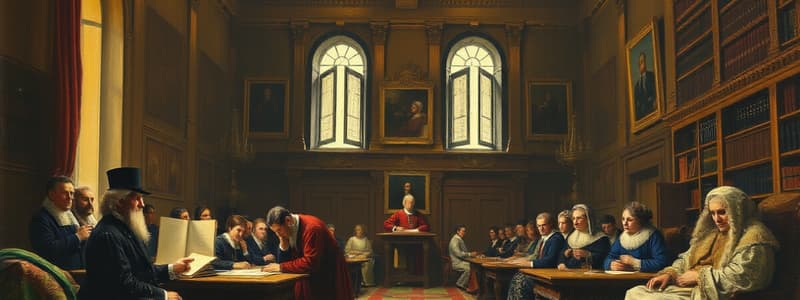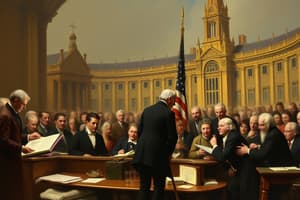Podcast
Questions and Answers
The Parliament Act was used a third time in ______ to pass a second Parliament Bill.
The Parliament Act was used a third time in ______ to pass a second Parliament Bill.
1949
Labour feared that the Lords would veto their proposed ______ and Steel bill.
Labour feared that the Lords would veto their proposed ______ and Steel bill.
Iron
The Labour Government unveiled its proposals in the 1947 ______'s Speech.
The Labour Government unveiled its proposals in the 1947 ______'s Speech.
King
The Lords' delaying power over legislation was reduced from two years to ______.
The Lords' delaying power over legislation was reduced from two years to ______.
The second reading of the new Parliament Bill was moved by ______ Morrison.
The second reading of the new Parliament Bill was moved by ______ Morrison.
Flashcards are hidden until you start studying
Study Notes
Parliament Act (1949) Overview
- The Parliament Act 1911 initially suggested potential reforms for the House of Lords, but no changes occurred until after WWII.
- The Act was previously invoked twice in 1914 to enact the Government of Ireland Act and the Welsh Church Act.
Key Events Leading to the 1949 Act
- The 1949 Parliament Act was driven by anticipated conflict between a Conservative-controlled House of Lords and a Labour-controlled House of Commons.
- Labour feared the Lords would block their Iron and Steel bill, prompting the reform discussions.
Legislative Developments
- Proposed reforms were introduced in the Labour Government's 1947 King's Speech, aimed at reducing the Lords' delaying powers from two years to one.
- Attlee described the Parliament Bill as "a wise precautionary measure"; Churchill labeled it as "a deliberate act of socialist aggression."
Political Context
- Attlee highlighted the contradiction of Churchill’s opposition, noting that Churchill was part of the Liberal government that passed the original Act in 1911.
- Despite the criticisms, significant opposition to the Government's reform was minimal in Westminster.
Passage of the 1949 Act
- King George VI was thought to support the measure, and Attlee clarified he had no radical plans beyond the reforms proposed.
- The Parliament Bill faced two rejections by the House of Lords in June and September 1948 before being reintroduced and granted Royal Assent in July 1949.
Outcome
- The Iron and Steel Bill ultimately became law without the need for the new Act, showcasing an ironic twist in the legislative process.
Studying That Suits You
Use AI to generate personalized quizzes and flashcards to suit your learning preferences.



